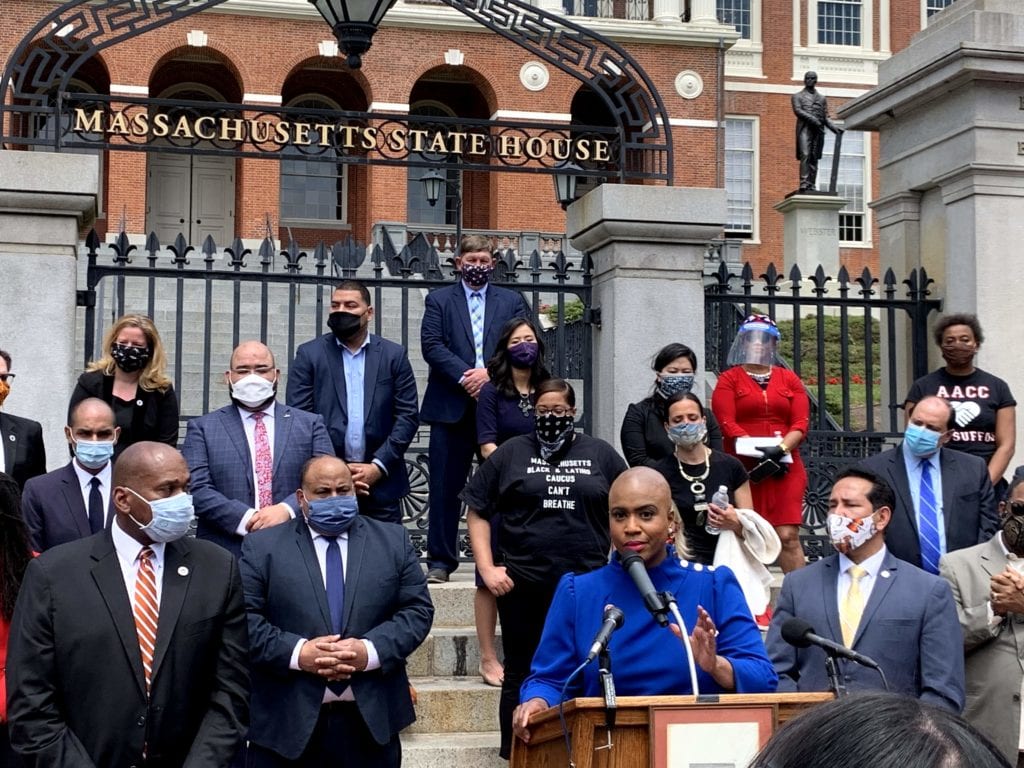Will demonstrations lead to substantive change?
Some see opening for long-sought reforms to police policies, practices

Black elected officials’ long-sought efforts to reform police practices are getting a new hearing after more than a week of demonstrations across the nation over the police killing of Minneapolis resident George Floyd.
During a City Council hearing last Thursday, Councilor Andrea Campbell outlined her priority reforms including full implementation of body cameras, a civilian review board, transparency in the department’s database of stops and searches, and clear protocols for use of force by police officers — all issues activists and councilors of color have sought progress on over the last six years.
In recent years, those efforts have hit stiff headwinds in the council chamber. In 2015, when activists first brought a proposal for body-worn cameras to the council, white councilors praised the police for doing a “phenomenal job” with community policing and questioned the need for body cameras. While some officers have been outfitted with the cameras, five years later the department has not yet fully implemented a program.
At the state level, members of the Black and Latino Legislative Caucus have been seeking support for a raft of criminal justice reform bills since 2015, with little success. Among the measures sought by Caucus members are a bill requiring local police departments to report data on the race of people stopped by officers, a bill that would require professional certification and de-certification processes for police and a bill that would require independent investigators for allegations of police misconduct.
Those bills have stagnated in committees over the last five years.
“The biggest roadblocks have been police unions,” said state Rep. Russell Holmes of Mattapan, who has been pushing for a statewide police certification requirement.
Holmes isn’t the only one pointing a finger at the unions. New York Congresswoman Alexandria Ocasio-Cortez called out the unions and the elected officials seemingly under their thrall in a tweet last week.
“I’ll just say it: a lot of politicians are scared of the political power of the police, and that’s why changes to hold them accountable for flagrant killings don’t happen,” she said. “That in itself is a scary problem. We shouldn’t be intimidated out of holding people accountable for murder.”
Ocasio-Cortez signed on to legislation introduced by U.S. Rep. Ayanna Pressley and U.S. Rep. Justin Amash of Michigan, who switched from Republican to Independent this year, that would end qualified immunity prohibitions on lawsuits against police officers for actions taken while on the job.
“Qualified immunity shields police from accountability, impedes true justice, and undermines the constitutional rights of every person in this country,” Pressley said.
While Pressley’s campaign coffers haven’t benefitted from large infusions of police officers’ donations, the reach of the unions’ campaign cash is considerable at the local level. The largest Boston police union, the Boston Police Patrolmen’s Association, reports $467,731 in its political action committee campaign account as of May 31. Individuals identifying themselves as police officers have donated more than $400,000 to Mayor Martin Walsh’s campaign account since 2013.
Police officers aren’t shy about throwing their cash around. In the two weeks after Walsh approved an 8% pay raise for officers in 2017, Boston cops kicked in more than $30,000 to his campaign account.
Black politicians have rarely been on the receiving end of police campaign donations. Suffolk County District Attorney Rachael Rollins received just $3,777 in donations from police during her 2018 run for office, while rival Greg Henning, a former Suffolk County prosecutor, netted $68,250.
When she bested Henning in a race with two other women and two other black candidates, Rollins joined a wave of reform-oriented district attorneys around the country who ran and won on platforms that promised to end the culture of police impunity and combat criminal justice practices that have for decades led to disparate incarceration rates for people of color.
Her victory, four years after the Black Lives Matter protests ignited a wave of demonstrations across the country, may have signaled a change in voter attitudes toward law enforcement that until now hasn’t seemed to catch the attention of the state’s political leaders.
But this week, the growing criticism of police violence was hard to miss.
During a City Council budget hearing Thursday on federal and state anti-violence grants the Boston Police Department receives, at-large City Councilor Julia Mejia noted a large volume of correspondence from constituents asking councilors to defund BPD.
“I grew up in Boston,” she said. “I survived the busing era. I don’t know whether I’ve ever seen so much distrust in our government.”
Councilors Kim Janey, Lydia Edwards and Andrea Campbell expressed frustration that representatives of the police department’s Boston Regional Intelligence Center did not make available a representative to discuss how the agency would spend federal funds. They said the council would not support the funding without a thorough accounting of how the funds would be spent.
“That grant isn’t going anywhere if we don’t have our questions answered,” Campbell said.
While Boston’s majority-people-of-color City Council seems more willing to challenge police practices than in the past, how the state Legislature will react to reforms being backed by its black and Latino members is still an open question.
House Speaker Robert DeLeo signaled to the Boston Globe that the Legislature is willing to discuss police bias.
“We must have difficult conversations about race, bias, and accountability,” he said in a statement sent to the newspaper. “We must work together. And we will.”
Rep. Holmes remains hopeful that his bill for police certification will pass in this session.
“We did get it out of committee this time,” he said.







